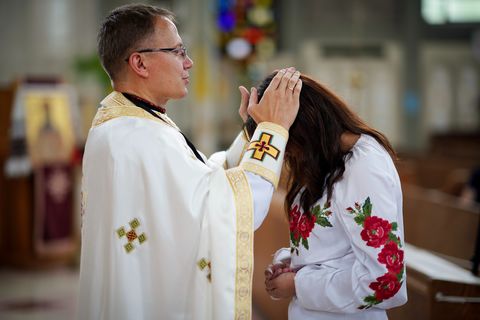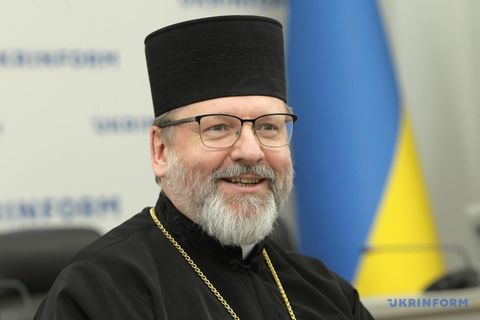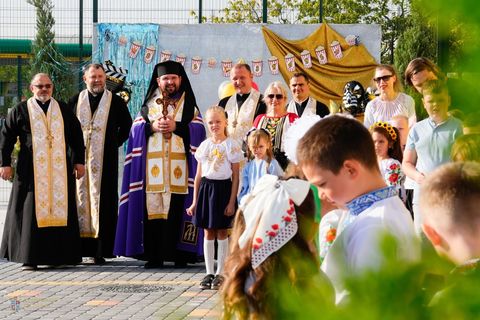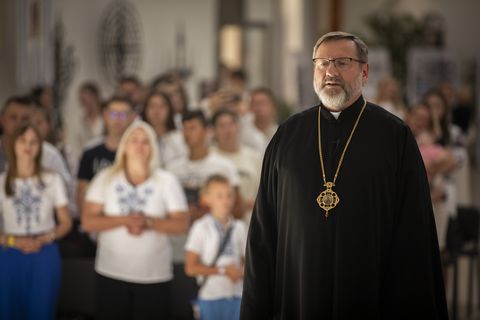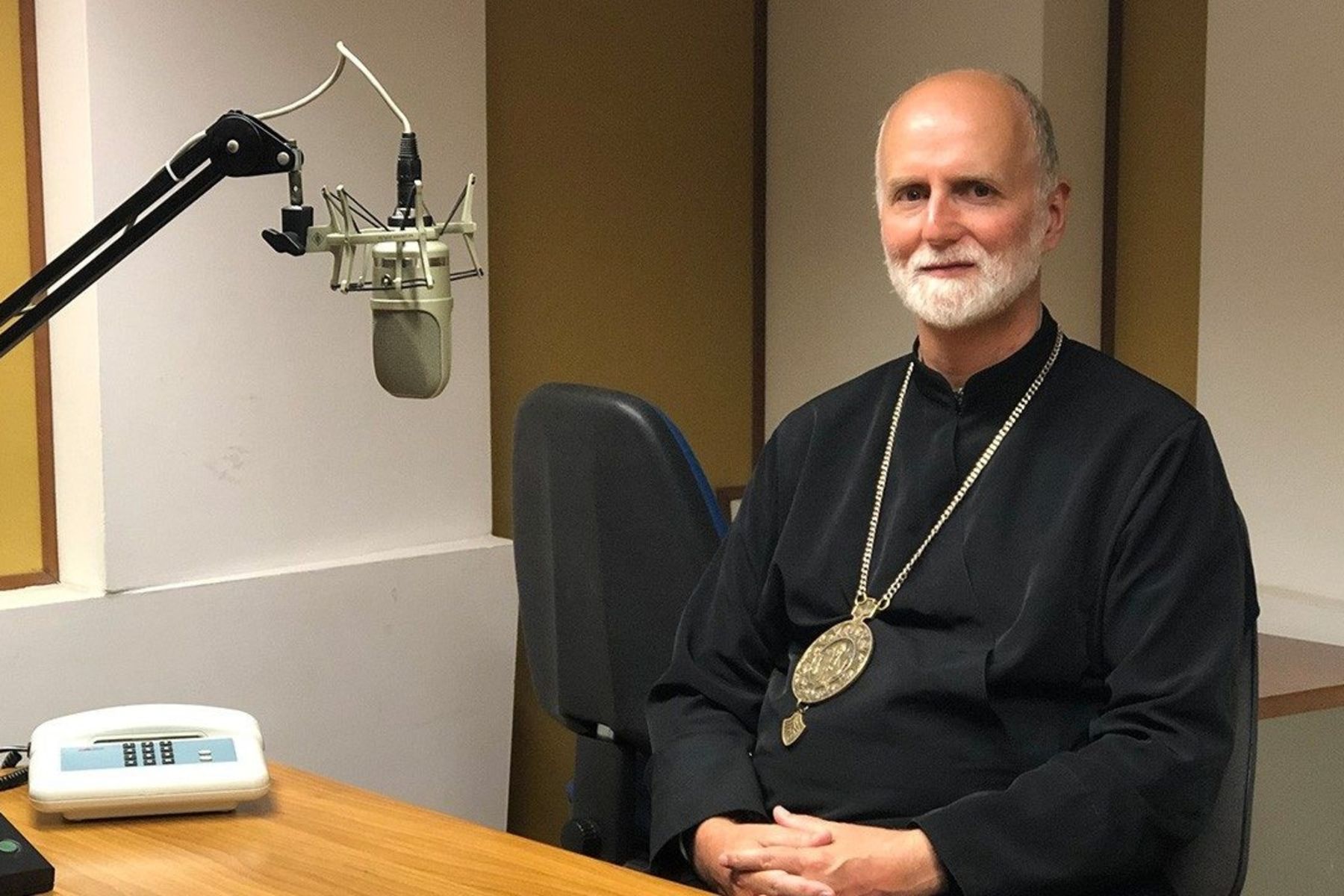
Metropolitan Borys Gudziak: Catholic communications called to spread the Good News
In an interview with Vatican News, Metropolitan Archbishop Borys Gudziak speaks about the aim of Catholic communications; the necessity of speaking the truth in the midst of disinformation; and the importance of solidarity with those who suffer injustice.
Interview with Metropolitan Borys Gudziak
Vatican Radio: Archbishop Gudziak, thank you for joining us this afternoon. You, of course, are a member of the Dicastery for Communication. And very happily, you were able to join us for our audience this morning with the Holy Father at the conclusion of the plenary assembly for the Dicastery.
One of the things the Holy Father talked about, and I know you’ve made a priority, is asking communicators to be builders of bridges in a time when so many people are raising up walls, and also artisans of peace, and the question of peace and being communicators and builders of peace is very important in this day and age, and especially for your Church and your people. Can you speak to that a little bit?
Metropolitan Borys Gudziak: Well, first of all, Chris, I’d like to express my appreciation to the work of the Dicastery of Communications, the hospitality. It’s the biggest dicastery in the Vatican. Over 500 people work here. It has radio transmissions in 53 languages, and also publications in many languages. L’Osservatore Romano comes out in seven languages regularly, so that is an incredibly complex mission of spreading the good news.
And I think that’s what the Holy Father was inviting us all in the world, especially this Dicastery, to do, to spread the good news.
There are divisions. The devil — the diabolos — is the divider. Diabolo is to divide in Greek. We are called to bring people together. We are called to live the life of the Holy Trinity. And that is our model, and what God calls us to: the love between the Father, the Son, and the Holy Spirit.
We as persons are really identified by our capacity for relationship. We thrive in relationship and we wither when we’re isolated and alienated. And so, the communications of the Catholic Church should be something that brings people together around the truth, around their destiny, around the great news that we’re loved by God, that God gave His only Son for our salvation, that Christ entered our world, our sinfulness, and our death; and death could not hold the source of life. It was conquered.
And so that should be the foundation and the main message that we share in many different ways regarding all possible topics in all the languages of the world. Using the, let’s say, beautiful aspects of God given cultures, of which there are thousands, really.
And that is an incredible assignment, an incredible vocation. Incredible in its beauty and its nobility, but also incredible in its challenge and in its difficulty.
And there is no more global organization, the Catholic Church. There’s no organization that communicates so directly to so many millions, hundreds of millions, even a billion people, as the Catholic Church.
And so the Dicastery for Communications, which seeks to facilitate this speaking out, this witnessing of the Catholic Church is a very important institution. And the Holy Father today blessed its activity and called it to really be that bridge builder that the Holy Father called the Dicastery, and all of us, to be bridge builders and heralds of good news.
Vatican Radio: And part of that you mentioned, the Church has the very wide reach throughout the world. It also, in a certain way, can stand above maybe some of the political or partisan divides and at the same time has a vocation to speak the truth and even speaking the truth to power…
Metropolitan Borys Gudziak: That’s always a delicate balance. Jesus was very tolerant. He went to sinners. He went to people that were, let’s say, on the margins of society.
But He also called a spade a spade. And in the global context of devastating wars, of genocides, of social inequality, of domination, even of slavery, we are called as Christians to speak the truth.
I, of course, know well the suffering of the people of Ukraine. Every day a hundred people are killed, one hundred persons every day. Hospitals, shopping centers, apartment buildings, train stations are hit. There’s a devastating attempt to beat down the people, and the Holy Father calling the Church to pray for the people of Ukraine.
We Christians who offer solidarity to victims have a very important role, because many wars today are harbored, and they are wars of information. And those who persecute, who kill, who destroy, who want to colonize, they want to make their actions acceptable, and they use information, disinformation, false news to manipulate entire audiences. And that’s why communication and the proclamation of the good news also often has to speak the truth about concrete situations.
Vatican Radio: We’ve already spoken a little bit about the war in Ukraine, the ongoing war, as you mentioned, a hybrid war that’s not just on the battlefield in Ukraine, but also in the information sphere. You personally are part of the diaspora of the Ukrainian Greek Catholic Church, the Ukrainian people who have spread throughout the world, in the United States. And of course, there’s a major election coming up for the [US] presidency, for offices throughout the country. And on that front, too, there’s a question of communication and information and speaking the truth. Can you speak about that? Perhaps in general terms?
Metropolitan Borys Gudziak: Well, there is a lot of concern about the maintenance of global solidarity, of people, of goodwill and countries of goodwill with the victim in this colonial war.
Different candidates in the US have expressed different positions. What is most important is that a majority of the American population, an overwhelming majority of the Catholic population in the U. S., all bishops, without exclusion, stand with Ukraine not because it’s a national issue, but because it’s an issue of truth and justice and human dignity, democracy.
And so, yes, we hope that whoever becomes the new president of the United States, that that person will take a prophetic position.
But even there, our confidence is not only in one person, it’s in the general populace of America, the voters who expressed their opinion to their senators, to their congresspeople. And we know, as a matter of fact, that a majority of the representatives in the House and in the Senate do support Ukraine.
So, I cannot say that I’m not concerned because the bloodletting continues. The devastation of the country continues. 4000 schools have been damaged or destroyed, almost 2000 hospitals, 15,000 miles of roads. The infrastructure damage in the country will lead to a very difficult winter, because they can’t fix all the heating installments and the energy grid. Estimates today say that the damage caused will require $1 trillion in the rebuilding project.
There’s great anxiety in my heart about this, but there is also a real trust in the Lord that God’s truth will prevail, that those who suffer, those who defend our God given dignity, will be defended by the Lord and by the countries and people of goodwill internationally.
Vatican Radio: Thank you so much, Archbishop. We’ll bring you back a little bit to the meeting with the Dicastery this morning, and the Pope’s call for us to speak and to share the good news, to be builders of bridges and builders of peace. What do you see, as a member of the Dicastery as a vision for the Dicastery going forward?
The Holy Father has spoken about being creative in fulfilling our mission in perhaps difficult times at the Vatican. What do you see as the vision going forward?
Metropolitan Borys Gudziak: Well, I spoke about two things, both in the small groups and in the plenary session.
Catholic communications, particularly those coming from the Holy See, need to have high quality. First of all, a high quality of witness, of spiritual witness. We need to really be announcing the Gospel as it has been given to us by our Lord.
We have to have a high quality and technology in in methodology in journalistic expression.
And the second proposal that I was making was the following: We have a lot of communicative systems, social media, and now AI, that has certain algorithms that are prepared, designed by people that have certain goals — or sometimes those goals might not be clear [even] to the designers [themselves]. We should platformize the message of the Catholic Church so that the algorithms are created by the Church and by our communicators, thereby assuring that listeners, viewers, our audience are participants in the global media network; can get the truth, can get the good news, can keep themselves from being dominated by an avalanche of negative news of divisive messages.
And that can be done, I believe, and this is what I said. You know, we have 1.3 billion Catholics: find the 20 most talented specialists in AI, in computer programming, in management of social media and general communications, and ask them to put together a Catholic platform that will put all good things Catholic and connect all Catholics who want to be connected according to algorithms that come out of our identity and are not algorithms controlled by somebody else who is looking to make money or manipulate, in a populistic way, large sectors of the global population.
Vatican Radio: That’s very ambitious…
Metropolitan Borys Gudziak: Well, you know, the Catholic Church is the first true global organization. It has spoken, articulated its message, its vocation in more languages and more cultures than any other organization. It is the oldest extant organization. It has a central authority that can harness and bring together the talents, the gifts of an incredible following.
And I think it should do it.
vaticannews.va